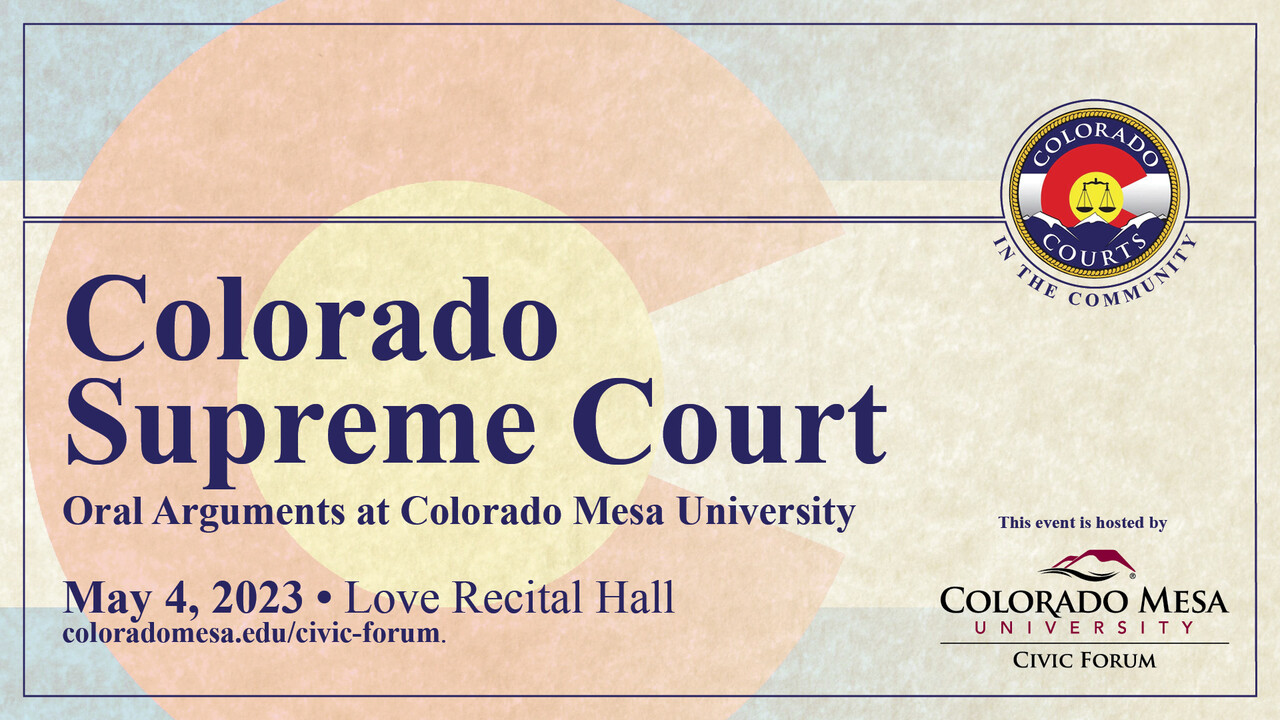This event is hosted by the CMU Civic Forum
The Colorado Supreme Court will hear oral arguments in two cases on Thursday, May 4, 2023, at Colorado Mesa University in Grand Junction before an audience of students. Limited seating for the public will be available, and the arguments will be streamed live.
The visit is part of the Colorado Judicial Branch’s Courts in the Community, an outreach program the Colorado Supreme Court and Court of Appeals initiated on Law Day (May 1), 1986. Courts in the Community was developed to provide Colorado high school students insight regarding the Colorado judicial system and illustrate how disputes are resolved in a democratic society. The program has occasionally brought the courts to institutions of higher learning. These are not mock proceedings. The Court will hear arguments in actual cases from which it will issue opinions. The Court generally issues opinions within a few months of the arguments.
All seven justices hear cases together. They are Chief Justice Brian D. Boatright and Justices Monica M. Márquez, William W. Hood III, Richard L. Gabriel, Melissa Hart, Carlos A. Samour Jr., and Maria E. Berkenkotter.
The two cases are:
- 23SA2, In Re: The People of the State of Colorado v. Jerrelle Smith: In this original proceeding (meaning the Supreme Court agreed to review a trial court’s decision on a particular matter before case has reached disposition in the trial court), attorneys for Jerrelle Smith argue that a trial court’s refusal to set bail for Smith was unconstitutional. Smith was arrested in Adams County in May 2022 and charged with first-degree murder, a class 1 felony. Smith’s attorneys argued that Colorado’s repeal of the death penalty in 2020 meant that Smith could not be exposed to capital punishment, and therefore he was entitled to bail. The trial court found that first-degree murder was still a “capital offense” and therefore Smith was ineligible for bail. Smith appealed to the Court of Appeals, which dismissed the appeal, and then Smith’s attorneys asked the Supreme Court to review the trial court’s decision to deny him bail. In their brief, prosecutors argued that for more than 50 years, the Colorado Supreme Court has consistently held that first-degree murder is a capital offense regardless of whether the death penalty may be imposed, meaning a person charged with that crime is ineligible for bail. But attorneys for Smith argued in their brief that the repeal of the death penalty rendered “capital offenses” obsolete, making any offense (with certain exceptions not relevant to Smith’s case) committed after the date of the repeal eligible for bail as a matter of constitutional right.
- 23SA12, In Re: ThePeople of the State of Colorado v. Gavin Seymour: This case is also an original proceeding. The Supreme Court agreed to review a trial court’s decision to allow evidence obtained through a search warrant served on Google in connection with an alleged arson in Denver in which five people were killed. In their investigation, police obtained a search warrant asking Google to give them the names of everybody who used Google’s search engine to look up the address of the house that was burned during the two weeks before the fire. Google refused to comply with that and a second, similar warrant, before police narrowed the search to ask for anonymized information along with the Internet protocol (IP) address of people who searched that house’s address. Google provided police with a list of IP addresses, including five that had accounts based in Colorado. A separate search warrant allowed police to obtain information about the devices and accounts associated with those IP addresses. After further investigation, police arrested Gavin Seymour, who then was charged with crimes including first-degree murder. In the trial court, Seymour’s attorneys argued the evidence police used to zero in on him as a suspect was obtained unconstitutionally and had to be suppressed. The trial court disagreed and decided the evidence could be used, prompting Seymour’s attorneys to ask the Supreme Court to review the decision.
The proceedings will begin at 9 a.m. Thursday, May 4, 2023, in the Moss Performing Arts Center at Colorado Mesa University, 1221 N. 12th Street, Grand Junction, CO 81501. A question-and-answer session, during which the students may ask questions of the attorneys, will follow the arguments in each case. At the conclusion of the second argument, the students also will have the opportunity to participate in a question-and-answer session with the Supreme Court justices.
Editor’s Note:
The documents related to these two cases are located at: https://www.courts.state.co.us/Courts/Education/Materials.cfm?s=Spring&y=2023
Additional information on the Courts in the Community program is available at: http://www.courts.state.co.us/Courts/Education/Community.cfm
News media organizations interested in recording the arguments may contact Jon Sarché at [email protected] or 720-625-5811.
